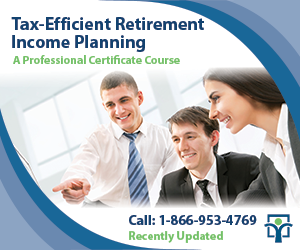
New Retirement Planning Course Is On the Cutting Edge
It takes specialized skills to marry tax and financial planning competencies to help clients adequately fund tax-efficient income requirements. Now tax and financial advisors can certify to specialize and provide this new value-added service with the newly revised Tax-Efficient Retirement Income Planning Course.
Planning tax-efficient retirement income is a skillset in great demand by the baby boomer demographic—the most affluent generation in our history—who seek credible, trusted and expert solutions to their complex retirement planning requirements, and view tax erosion as the biggest threat to their wealth. In fact, with recent tax changes that introduce a high-income tax bracket, this is more true than ever.
This course allows advisors to develop a consistent process for multi-generational planning that looks not only at tax efficiency of income, but also at the tax efficiency of the capital left for spouses and heirs, using cutting-edge tools to predict how sustainable savings will be, and what can be done through income averaging, income splitting and tax deferral.
CERTIFIED SKILLSETS: This course covers a holistic retirement income planning process, which will result in the student acquiring the skills to do the following:
 |
- Use a financial assessment tool around which to structure the client’s pre- and post-tax retirement income needs and monitor ongoing results on a projected Net Worth Statement.
- Do a proper assessment of client vision and goals for retirement, and engage clients in a consistent process for addressing the three trigger issues that cause financial decision-making: life events, financial events and economic events.
- Establish a strategic “real wealth management plan” based on client needs for tax-efficient income as well as after-tax capital preservation, growth and transition.
- Establish action plans, including savings and withdrawal strategies, for a long-term, tax-efficient retirement income planning approach around the three specific phases of retirement planning—pre-retirement, in-retirement and post-retirement.
- Be conversant with recent tax changes relating to personal taxation, in particular those related to public-pension planning options, the integration of work life into retirement life and planning to avoid clawback zones.
- Plan with pre-retiring employees in negotiating severance, maximizing RRSP rollover opportunities and taking advantage of income splitting with the spouse.
- Plan a 20-year retirement income plan that minimizes capital encroachment in order to preserve as much savings as possible for an uncertain future and, in addition, averages down taxes on the many layers of income sources that will be earned by a couple in retirement.
- Through a variety of “Advisor Think Tanks” and case studies, demonstrate the customization of a retirement income plan and responses to specific questions pre-retirees have, such as, “Do I have enough?” “When should I take my CPP pension benefit?” “What should I do with my severance package?”
- Provide post-retirement guidance to survivors and plan for the most advantageous asset transfer opportunities.
©2016 Knowledge Bureau Inc. All Rights Reserved.





